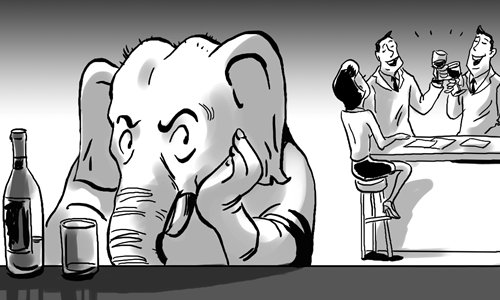India should reassess B&R from a new angle

Illustration: Liu Rui/GT
New Delhi recently refused to join Beijing's Belt and Road initiative citing sovereignty concerns as the China-Pakistan Economic Corridor (CPEC) will run through Pakistan-controlled Kashmir, a region that New Delhi believes belongs to it. Therefore, India worries the CPEC project will infringe upon its sovereignty.
Border disputes, including those between China and India, are often the result of unreasonable colonial orders and many remain unsettled after decades. Military clashes are frequently seen in Kashmir, causing casualties on both sides.
India stresses that problems should be solved in accordance with international norms. This is true. But these conflicts and crises were actually generated under an imposed order, and thus cannot be solved within such a framework. This conundrum shows why the original order cannot be kept and must be readjusted.
Now it's time to change the old way of solving these issues. As conflicts persist and no new rules are adopted, why can't we put these issues aside and pursue a project or program that is based on consensus as the first step to establish mutual trust?
"We should build the Belt and Road into a road for peace," Chinese President Xi Jinping has stated on the Belt and Road Forum for International Cooperation (BRF), elaborating on how to redevelop the concept of win-win cooperation at a higher level. Systematized and pillared by concrete cooperative projects, win-win cooperation takes into account the interests of all parties concerned as well as ordinary people's life.
If New Delhi joins and contributes to Beijing's infrastructural initiative, this will help alleviate tensions and confrontations between India and Pakistan. More importantly, the initiative can enhance local people's living standards.
Civilians in the Kashmiri area have suffered from poverty and armed conflicts for decades. A responsible government has no reason to keep these innocent civilians enduring such ordeals.
Development is the solution to various issues. If the Indian government can take a step forward, even a small one, it will be written into the annals of history.
The Belt and Road initiative is a framework, adhering to the principle of respecting mutual trust and interests. To build win-win cooperation is the keystone of international relations, which stresses new ways of solving conflicts and crises while exploring new ideas to lead the change of global governance. This creative and visionary new road-map is concrete and pragmatic, taking a holistic consideration of the overall situation.
During the BRF, Chinese and foreign participants have conducted many bilateral and multilateral exchanges on all kinds of large and small cooperation projects, covering finance, industrial complementation, business cooperation and other specific issues.
The win-win concept is the essence of the "Chinese Approaches" raised by China to deal with hotspot issues plaguing international affairs in recent years. It can also be seen as "New Road Signs" with Chinese characteristics for the world to move forward.
The concept inherits the principle of shelving disputes and joint development put forward by former Chinese leader Deng Xiaoping in the 1970s. However, it was hard to promote the win-win concept at that time, as China was not strong enough to overcome restraints and many countries were susceptible to Western-dominated orders and rules.
Now China has taken the lead in this path and has the will and ability to help more countries advance in this direction.
The author is a senior editor with People's Daily, and currently a senior fellow with the Chongyang Institute for Financial Studies at Renmin University of China. dinggang@globaltimes.com.cn. Follow him on Twitter @dinggangchina

